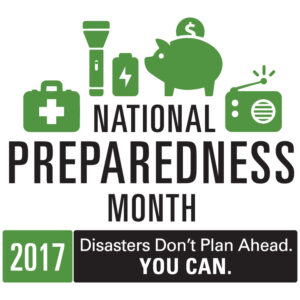 Did you know that September is National Preparedness Month? While this is a vital topic year round, each September sees resources being shared for families, congregations, schools, government organizations, and businesses to become better prepared. With fall on its way, this is the time of year to start readying ourselves for potential events that arrive as winter sweeps into the Northern Hemisphere. This year these matters are particularly on our minds, thanks to the devastating effects of hurricanes Harvey and Irma.
Did you know that September is National Preparedness Month? While this is a vital topic year round, each September sees resources being shared for families, congregations, schools, government organizations, and businesses to become better prepared. With fall on its way, this is the time of year to start readying ourselves for potential events that arrive as winter sweeps into the Northern Hemisphere. This year these matters are particularly on our minds, thanks to the devastating effects of hurricanes Harvey and Irma.
If you would like to become better prepared, you can click on thru to the Ready.gov website (via the image to the right). There you’ll find a wealth of information from the United States’ Federal Emergency Management Agency (FEMA) – whether you are looking to get started because of what you’re seeing in the news this month; or because of a change in your life, such as becoming a caregiver to a child or elderly family member; or if you just think it’s time to review things at your business or place of worship and see where you can improve.
Additionally, I’ve got a quick list of things you can do this weekend that will put your family on the path to being more prepared. Each of these tasks will take you less than half an hour and can be done for free or on the cheap. It is my hope that this little list will get you thinking of other things that can help you through the trials life can throw your way with just a few baby steps here and there – no zombie-proof compound required!
- Test smoke alarms and CO detectors. Replace batteries as necessary.
- Call or visit your local fire/police department and ask about having child safety seats checked for proper installation. (You may want to call ahead – some departments need you to make an appointment with their specialist.)
- Check your medical records – when was your last tetanus shot? If you can’t remember, or are close to the ten-year mark, it’s time to schedule a booster with your healthcare provider. (If you can get the TdaP, you will get a booster against whooping cough [pertussis] as well.)
- Check the tread on the tires of all vehicles you drive/ride. Are you due for replacement soon? Is there uneven wear that indicates a need for maintenance or repair? In many areas, fall and winter weather can bring rain, ice, and snow that require good tires for safe transportation, whether you’re on a bike or in a car.
- Write down the contact information that you normally keep in an electronic device and put it in a safe place. I know, I know, that’s so 1999 of me! But really, if you couldn’t charge your phone and needed to call several people in an emergency, how many of those numbers do you have memorized? (Pro tip: your husband’s work number has actual numbers in it, not just “Hey, Google …” or “Siri, call …” *wink*)
- Verify the contact information of the family members or close friends who act as emergency contacts for your family. Has anyone moved or changed phone numbers? Make a note of it and be sure to contact schools and childcare providers with the updates on Monday.
- Check into local CPR/AED and First Aid classes in your area. Many fire departments and local Red Cross offices offer them for free or at a very low cost. If you work outside the home, ask your Human Resources or Security leads if a group class could be scheduled at your workplace to get folks trained on the corporate budget. The more citizens who get certified in CPR/AED and First Aid, the more of us there are to respond in an emergency – something that is a worthy investment for any employer!
- Hit the local library and find a book, e-book, or audiobook about an aspect of preparedness that you don’t know about yet. It could be anything from foraging wild edibles to canning food, wilderness medicine or vehicle maintenance to getting debt free. Pick something new to learn that will give you survival skills or help your budget and allow you to put some money in savings.